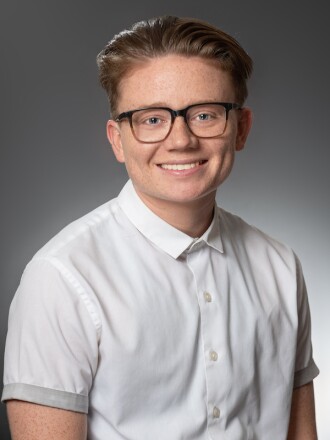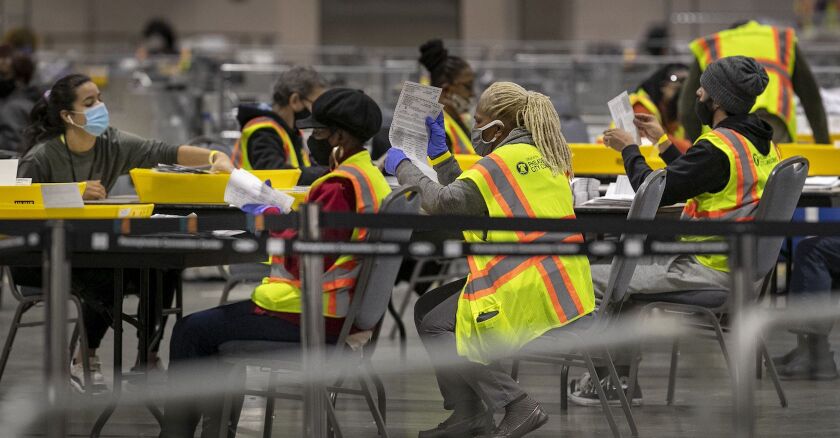In Brief:
From 2000 to 2019, Noah Praetz served as director of elections for Cook County, Ill. Looking back with a degree of nostalgia, he recalls a “wedding planner” era. “You threw a party, you invited people to show up, you got results and it was over.” That ended with Bush v. Gore. Equipment problems and voter disenfranchisement in Florida fueled controversy about the outcome and brought changes to election administration.
The Help America Vote Act, passed in response to the 2000 crisis, allocated $3.2 billion for new technology and established new standards for conducting elections and maintaining voter lists. “All of a sudden, election administrators had to adapt and become IT and legal compliance managers,” Praetz says.
In 2016, Russia targeted elections systems in every U.S. state. No votes were changed, but cybersecurity management became another responsibility for election officials. In 2020, contagion of both COVID-19 and conspiracy theories added physical security, communications and public health to the job description.
“The competencies required to do this job well just exploded over the last couple decades.” Praetz says. In his current job as president of The Elections Group, a professional services firm, he’s hoping to do something about this by partnering with the Bipartisan Policy Center (BPC) to create the Election Workforce Advisory Council.
Members of the council will guide long-term projects to develop and implement practices that can improve training, recruitment and retention of election administrators. The group includes current election administrators as well as leaders from election official associations, academic researchers and workforce experts.
The council will draw on insights from occupational health, psychological science and election science, says Rachel Orey, senior associate director at BPC. “We're approaching this issue from a holistic perspective — we can learn from other sectors as well as from elections.”
“We’ve survived for a couple of hundred years running elections in the apprenticeship model,” says Praetz. The combination of new job requirements and an accelerated rate of turnover mean those days are over.
Dealing with Departures
Since 2020, election directors have left their jobs in record numbers. Expanded responsibilities have come in concert with a climate of threats and harassment that is one big stress too many.
The Brennan Center estimates departures are at a rate equivalent to one to two election officials each day. In western states, half of all voters will vote in elections run by different chief election officials than were on the job in 2020. Nationally, in 2024 about 1 in 5 election officials will be running a presidential election for the first time.
Paul Manson, research director for the Elections and Voting Information Center at Reed College, is a member of the council. He’s been surveying local election officials annually since 2018 and mentions an aspect of attrition that may not be well observed.
The people responsible for election day activities are disproportionally women, usually paid less than their peers in the same level of government. For those who came into this work a decade or so ago the understanding was that certain periods of the year would be busy, but the workload would be manageable at other times.
“We ask women to work not just in the workplace, but at home and with older generations,” says Manson. With new pressures and new demands, they are losing the ability to balance these other “careers” with their jobs. “We see departures based on that stress.”
Even with turnover, there are structures in place to bring new workers up to speed and ensure the 2024 elections will run securely and smoothly, Orey says. The council can give extra support to them. “We have a swath of resources that will be coming out over the next couple months that hope to set election officials up for success in 2024 and lay the groundwork for long-term sustainable reforms.”

(Eric Fey)
Better Together
Eric Fey, director of elections for St. Louis County, Mo., is one of about a dozen current election officials on the council. He’s already involved in professional development in his roles as president of the Missouri Association of County Clerks and Election Authorities and secretary of the International Association of Government Officials.
As an entry-level employee at the board of elections in 2007, Fey was struck by the scarcity of professional education tailored to election administration. “Having our staff continue their education, trying to recruit and hire people that have relevant competencies and learning from other practitioners across the country has always been very important to me,” Fey says.

(Heaven Brown)
“You can learn a lot from other election administrators, especially in jurisdictions of a similar size, take what they’re doing and implement the pieces of it that fit within your statutory framework,” he says. “I’ve taken a lot from that approach.”
Orey agrees it’s important to bring stakeholders from across the country together to generate new ideas. “If we're all working on this separately, that's not as powerful as us coming together, pooling resources and thinking about how we can really solve this issue as one election community.”
Not Just Training
Recently, the council published a request for proposals for research projects “that generate new findings on election administration recruitment, retention and training.” Manson would like to see compensation studies and job analyses included in the research the council supports.
Job titles and descriptions, and the hiring process itself, don’t reflect the work that election officials do, Manson says. “They need to be a sort of a constitutional scholar, they have to interpret and implement policy; they need public relations skills in order to engage a public that can be hostile or ask really hard questions.”

(Lauren LaBarre)
The perception that election administration is relatively uncomplicated, or a task for partisans, needs to change, Fey says. “It needs to be taken as seriously as the director of the department of transportation, or the police chief — take your pick from local government. It is that important, and it needs to be treated as such.”
The varying methods by which election officials are chosen make this transition a challenge, he says. Some are elected, some appointed on the basis of partisan loyalty; administrative ability isn’t always the guiding factor. “Maybe it’s not a great idea to hire people at the election office just because their uncle is a state representative, or their sister is a committee person in a party.”
The council is committed to a long-term effort to change this culture, but a consequential election season lies immediately ahead, according to Orey. “We're available to provide guidance and support; that is certainly the case."
Related Articles














